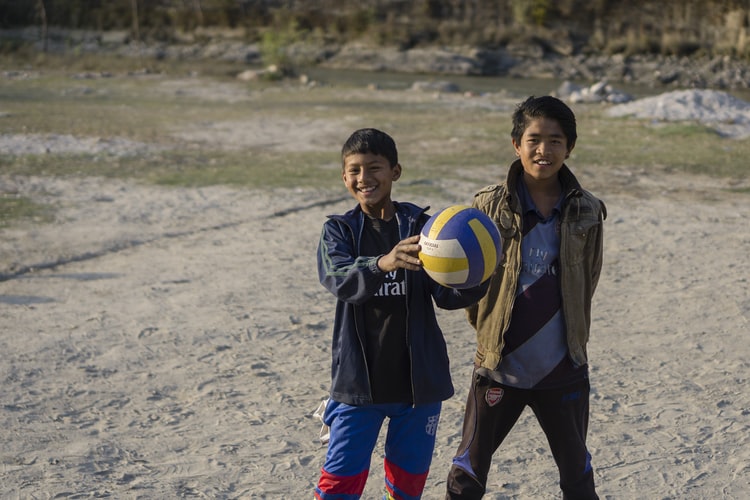How Teens and Tweens Can Learn to Lose With Grace
Losing may be an inevitable part of sports and life in general. But, accepting defeat graciously is an honorable skill that is acquired only through years and years of practice. Nobody likes sore losers, and the inability to take a loss in stride takes all the fun out of playing competitive games.
There is dignity in being able to smile and accept defeat, no matter how much one wanted to win. Even the world’s best athletes lose every once in a while. So, the earlier you learn how to do it graciously, the better.
Here are 10 practices you can do to show that you are able to lose with grace.
RELATED: How to Win Graciously – A Guide for Tweens and Teens
1. Prepare for it
It may be counterintuitive and defeatist to walk into a competition-ready to lose, but all you have to do is recognize that every competition produces both winners and losers. So, there is always a chance that you might not end up with the trophy.
Of course, you must still work hard and do your best in order to win. But realizing that your opponents have just as much chance at winning as you do can give you more control over your reaction when the inevitable happens.
Always remember that every single word you utter and every move you make after a loss may be overanalyzed and blown out of proportion, so you do have to be careful. Once you are branded a sore loser, it can be difficult to shake off. While the media might enjoy the spectacle and even the stories, having a ‘bad boy or girl’ image is ultimately detrimental to your future in competitive sports.
So what exactly must you do to exhibit grace and dignity after a loss?

2. Congratulate your opponent

This is the first thing you have to do after the match is over or once the results are announced. In higher-level competitions, it is part of the post-game formalities for participants to shake each other’s hands. Even if it is not mandatory, though, be the first to offer to shake hands with the winner.
While it’s normal to feel a certain level of resentment towards the person who has just defeated you, you need to push down these feelings because your opponent deserves gratitude, respect, and kudos.
First of all, thank them for playing with you. Then, congratulate them for winning, and if you have enough time, pay them a compliment or two about how they played. Do this even if the other party is a gracious winner (It happens). Always be the bigger person and make sure you don’t have any regrets about the way you behaved towards the winning player/team.
There is glory in winning, but there is dignity in losing with grace. Here’s how teens and tweens can exhibit graciousness in defeat. Share on X3. Never badmouth your rivals
It is not enough that you are nice when talking to your opponent — you also have to watch your words when talking about them to someone else.
As I mentioned earlier, it’s only normal to feel bitter towards someone who has conquered your best efforts to win. However, saying mean things about other players or diminishing their victory only reflects badly on your own character, and makes you come off as insecure, juvenile, and unprofessional.
Avoid saying things like, “She only won because I wasn’t feeling well,” or “He wasn’t that good, I was just distracted.” Instead, say only nice things about your opponent or the match that you just had. On the off chance that you cannot think of anything nice to say about the competition and the winner, then just don’t talk about it; it’s infinitely better to say nothing than to badmouth your fellow athletes.
Accepting defeat with a smile on your face is an art that only the strongest, most mature athletes have mastered. Here’s how teens and tweens can start practicing it in their games. Share on X4. Ignore the trash talk
Note that trying to be a graceful winner becomes ten times more difficult when you’re dealing with a victor who’s not exactly a gracious winner. You will undoubtedly encounter some young athletes who have yet to learn the art of winning graciously, so you will have to double down on being the bigger person.
If the winner ends up talking down on you or bragging about how he/she defeated you, simply smile and shake their hand. Don’t give them satisfaction by retaliating or countering their trash talk – it’s just not worth it. Show that you are a lot more mature and professional by ignoring the taunts.
At most, you might make them uncomfortable about the way they’re acting, thus helping them improve in terms of sportsmanship. Even if they don’t take the hint, every other person in the room will surely come to appreciate and admire your attitude more for not stooping down to a trash talker’s level.

5. Don’t play the blame game

Playing team sports is tough because you will never have full control over the outcome of the game. If one of your teammates stumbles or makes a mistake, it can cause everyone to suffer.
When this happens, though, you must never ever play the blame game. Understand that your friend is already probably feeling bad about what happened, so there’s no need to pile onto that. Bear in mind that they wanted to win just as much as you did, so there’s no use giving them a hard time for making a mistake.
If anything, every single one of your teammates deserves thanks after playing their hearts out. In fact, part of being gracious in defeat is facing everyone who played with you, coached you, supported you, and cheered for you along the way.
Losing is inevitable in sports and in life. The sooner you learn how to take it with grace, the sooner you can be a better athlete. Here are 10 tips on how to lose graciously. Share on X6. Own up to your shortcomings
Now, what if you were the reason why your team didn’t win? May it be because of a missed goal or a lapse in judgment, be fair and brave enough to admit it to your coaches and teammates. If they’re graceful in defeat, too, they won’t be blaming you for it, but the gesture of owning up to your mistake will surely be appreciated.
Processing defeat is also easier when you know exactly what you did wrong that made you lose the game. One of the things that create sore losers is being too hung up on trying to find out why they didn’t win. However, if you already know this, you can move past the defeat and simply focus on doing better next time. If you’re not sure what you did wrong, be open to hearing feedback from your coach or your teammates. Sometimes it’s hard to reflect when we are deeply embedded in a situation.

7. Enjoy the game
One of the most underrated ways to be graceful in defeat is by learning how to enjoy the game and not just the victory. There’s no doubt that winning feels great and should be the ultimate goal of being a competitive athlete, but it surely is not everything. If you play because you genuinely enjoy the game, you might not mind losing so much.
Your parents, coaches, and mentors will definitely try to instil a winner’s mindset in you, but personally, you have to find other reasons to enjoy being an athlete that’s not exclusively tied to winning. Enjoy the game, enjoy the adrenaline rush it gives you, enjoy the camaraderie you have with your teammates, and enjoy the revelries — this way, you will have countless things to be happy about even when you don’t win.
All the best athletes know how to be graceful in defeat. It’s easier said than done, but here are 10 things you can start doing to train yourself to lose graciously. Share on X
8. Take the lesson

A famous saying goes: “Sometimes you win, sometimes you learn.” Live by this mantra and you will surely take every loss with a brand-new perspective.
Always ask yourself: “What is this loss teaching me?” Sometimes, the answer could be as simple as teaching you a new playing style or helping you realize that you have to practice a whole lot more. Other times, the lesson might not be as explicit. If you can’t figure it out at once, don’t hesitate to approach adults like a coach or a parent to help you.
For sure, they are able to notice things from when you played that they can comment about. Their perspective and feedback can help you not just improve your game, but also help you pick up the best lessons from every defeat.
Losing is a natural part of life, but losing with grace requires years and years of practice. If you can do these ten things, though, you know you’re already on to a great start. Share on X9. Talk it out
Some losses hurt more than others. Maybe you worked harder than usual to win, or maybe you really wanted the prize at stake, or you simply thought you were the best contender in the contest and could not possibly lose.
At times like these, it becomes even more challenging to accept defeat with a smile on your face. Luckily, you don’t have to. Crying is a cathartic release and must not be held back, although it would be better to cry when you’re alone with your team in the locker room, or with your parents in the car.
Talk to them about how you’re feeling since they can definitely help you understand the complex emotions you are going through. Resentment and bitterness can build up underneath the surface when you don’t let yourself feel things. So, bear in mind that sometimes, it’s okay to be ‘not okay’ about losing. It’s all just a matter of managing emotions so that you don’t end up hurting or lashing out at anyone.

10. Keep playing, keep improving

Finally, keep on playing the game you love. One bad game does not make a bad athlete — only quitting does. Take your loss as an opportunity to do better next time and don’t ever think about quitting, unless you’re absolutely sure that playing sports is no longer making you happy.
If the prospect of playing and winning still excites you, then you’re not done playing. You just don’t want to lose anymore. Therefore, all you really have to do is keep on improving your skills and putting in the hours so that in the future, you will get more opportunity to showcase how you’re just as graceful in victory as you are in defeat.
Being gracious in defeat can get you far ahead in life, especially if you’re considering playing sports at the professional level. It might be a little way down the road, but it’s never too early to acquire the necessary mindset for it. No one wins all the time, so learning the art of accepting defeat is definitely a crucial part of the journey.
RELATED: How to Win Graciously – A Guide for Tweens and Teens










